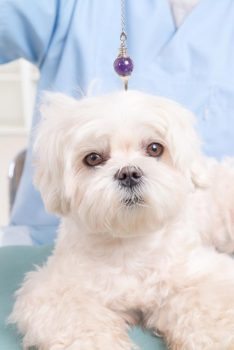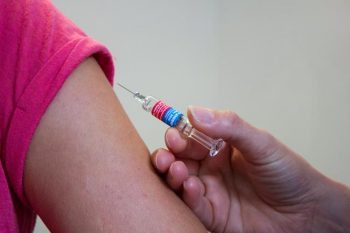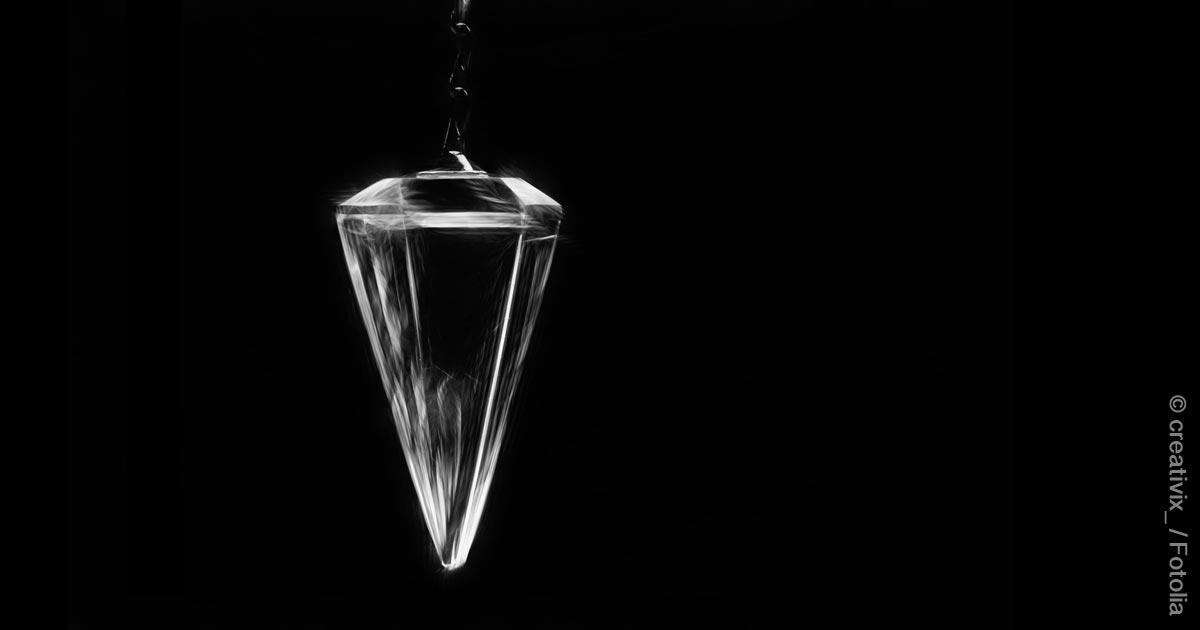I gently squeeze the cat’s abdomen. There isn’t much to feel, but the muscles tense and the cat looks at me reproachfully. A tiny bead of bloody urine appears at its vulva and drips on to the consult table.

“I think we’re dealing with cystitis here,” I said. Of course, technically it’s probably feline lower urinary tract disease, but “cystitis” is a much easier shorthand for clients.
I’m about to launch into my discussion about how it is usually sterile and antibiotics aren’t generally required, as well as differentials, when the man reaches a hand into his pocket, a serious look on his face.
He’s fairly normal to look at – middle-aged, balding, greying – and so I have no idea what he’s about to do. It crosses my mind he may be about to tip me – something a few clients have tried, very sweetly, to do in my time – but instead he produces a crystal the size of a small satsuma and dangles it from a string above his pet.
The cat and I watch, bemused, as the man taps the crystal so it starts to swing in a slow, wide circle.
An awkward silence follows – awkward for me and the cat, anyway. The man is concentrating too hard. I wonder if I should get on with the consult, bravely ignoring the bizarre scene, when the man looks at me and nods slightly.
“The crystal says you’re right.”
He slips the crystal back into his pocket like a magician finishing his trick and, now I have the permission of an inert piece of cut glass, I am able to finish the consultation and put my patient on the treatment it needs.
Complicated
The sentiment of anti-science and anti-expert opinion, which seems to be winning the public mood, is nothing new to veterinary practitioners.
I’ve been having consults like this for years. I once had a client tell me, with a straight face, her horse whisperer had informed her that her dog had told her horse it had a “pea-sized lump in its urethra”. I couldn’t find any such mass, but I got the distinct impression from the client this was my failing, rather than the horse whisperer’s.
To some extent, I understand the sentiment. It can be hard to tell the difference between peer-review science and professional-sounding nonsense, even among the scientifically trained. I think medicine suffers particularly in this regard because – rather like Earth’s climate – biological entities, even the simplest ones, are incredibly complicated and our understanding of them is far from complete. Sometimes, we just don’t have the answers we need and sometimes when we do, we don’t have any solutions to the problems we have uncovered.
These are the gaps into which superstition and pseudo-science creep in, and they’re tempting, even for practitioners; you only have to read the Veterinary Times letters page every week to see it. It’s a problem worsened by the fact an assumption seems to exist that the placebo affect does not apply in animals when, in fact, good evidence shows it does, and so any effect seen must be due to the treatment itself.
There’s nothing magical about “science”, it’s just a shorthand word which means “things we know to be true or false because they’ve been tested in a way that removes the possibility of influence of other factors”. It’s not restrictive, close-minded, biased or conservative – it’s just a collection of facts and theories being tested.
It’s not perfect, of course. While science itself isn’t close-minded or biased, its practitioners can be – especially when they are on the defensive – and this doesn’t help our cause.
Under pressure

A few months ago, my son suffered a febrile seizure two days after receiving a vaccination. It was one of the most terrifying experiences of my life, but he was fine within a couple of hours.
Two hours of absolute hell is, to my mind, much better than the lifetime that would follow losing my son to meningitis, so, although I’d much rather it hadn’t happened, I told myself it was worth it for him and the millions of other children than don’t suffer post-vaccine side effects.
Now, honestly, I don’t know whether it was the vaccination that gave my son the fever causing his seizure, but I do know it is a possible side effect of the vaccine. It was, in my terms, on the differential list at the very least. However, not a single doctor we spoke to even entertained the idea the vaccine could have been to blame. One of them told us a flat “no” when we asked us if it could be due to the vaccine, while the rest either said that it was “extremely unlikely” or that “we would never know” the cause.
Vaccinalienation
I understand it. Vaccines, which have probably prevented more suffering than just about anything on the planet (except perhaps sanitation), are under pressure from groups that, inexplicably, think they cause more harm than good. This tragic line of thinking has prevented the eradication of polio and led to children in the first world being crippled by, or even dying from, measles.
I can understand why doctors are wary of saying anything negative about them at all, but that’s not science. You don’t tell people the bits you want them to hear. You tell people everything, because you can only tackle a problem when you understand it.
Yes, my son’s vaccine probably (not definitely) caused his seizure, but he now has a greatly reduced change of contracting a certain type of meningitis – and if he had caught that, this story wouldn’t be a few hours of horror to illustrate my point, it would be something that destroyed a family.
Vets will always have consults like the one that opened this blog, but, in the wider public sphere, science is under threat and mistrusted like never before. If we want to restore trust, we need to be honest. Science is not perfect, but just like democracy, it’s better than everything else we’ve tried.
Addendum: Elliot had his second vaccination against meningitis with no side effects; I’ll be doing the same for my daughter.

Leave a Reply